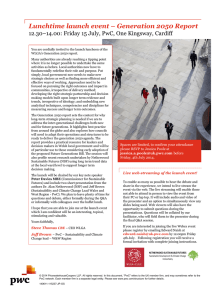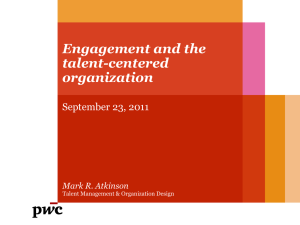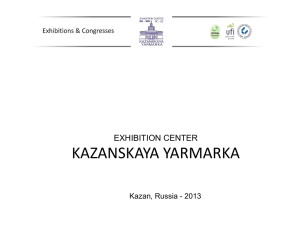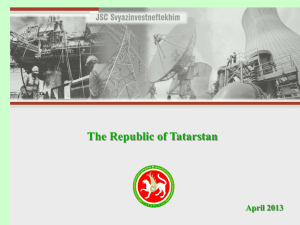PwC experience - Tatarstan Investment Development Agency
advertisement
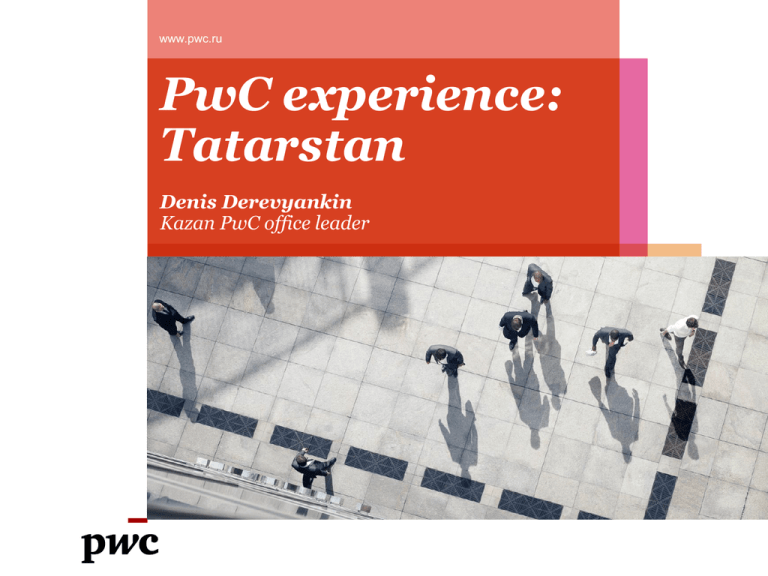
www.pwc.ru PwC experience: Tatarstan Denis Derevyankin Kazan PwC office leader Content 1. Introduction 2. PwC experience: what is Tatarstan for our business? 3. Some hints about Tatarstan PwC Russia 2 Personal Introduction • Kazan PwC office leader • Experience in the profession near 10 years • Work area – whole Russia, from St-Petersburg to Okhotsk • Clients – international, local, public, private • 2 years in Kazan with family Denis Derevyankin PwC Russia 3 Office Introduction • We opened in 2007 • Office in Kazan was 4th operational office in Russia for PwC after Moscow and Saint-Petersburg • With near 120 employees it’s third-size office in Russia • Practice is focused on development of one region, but provide wide range of services • Top companies of Tatarstan are serviced by PwC We are here PwC Russia 4 PwC experience: what is Tatarstan for our business? • There are many questions, when you enter other region: • Is it administratively easy? • Are there any perspectives in the region? • Is cost of enter less than forecasted benefits? • Will you be able to react to market quicker? • Do you understand formal and informal rules? • Is there your favorite restaurant in the city? Why? PwC Russia 5 PwC experience: what is Tatarstan for our business? Active business community Developing middle market segment, seeking for new integration forms Reduced cost base – office rent, transportation, supportive services PwC Russia Oriented on region development government Resource base – excellent educated people 6 PwC experience: what is Tatarstan for our business? • Real life example of benefits of the region used by PwC: • We put Shared Service Center (for Audit services) in Tatarstan • It’s internal department, the main goal of which is supporting of audit teams in Russia by providing standardized services • Current plan - audit time transfer to SSC is almost 30% of all our time cost in Assurance Russia • Why do we such investment to Tatarstan? What does differentiate? PwC Russia 7 PwC experience: what is Tatarstan for our business? Regional benefits utilized in creation of SSC: • Mix of industry-specific educated students (center of education in Volga region) with less staff cost (average salary and internal training supportive expenses is less on 20% in comparing with Moscow) • Small rent cost (sq.m. in Kazan office is in 10 times cheaper for us than in Moscow) • Sufficient IT infrastructure, because work of SSC depends significantly on network quality • Life cost is 30-50% less (vs Moscow) for management, that let us transfer top-level specialists on start-up stage from other regions What does differentiate? PwC Russia 8 Some hints about Tatarstan Tatarstan is one of Russia’s most economically developed regions. It is located in the centre of a large industrial region, 800 kilometres east of Moscow, at the confluence of the Volga and Kama rivers. PwC Russia • Geographical location • Transportation corridors • Ports • Transportation pipes • Airports What is else? 9 Some hints about Tatarstan Area: 67,836.2 sq. km Population: 3.8 million people Tatarstan stretches 290 km from North to South and 460 km from West to East Tatarstan has a moderately continental climate. Official languages are Tatar and Russian. Predominant religions are Islam and Orthodox Christianity 75.4% of Tatarstan’s residents live in urban areas. The capital is Kazan (area: 614.2 sq. km; population: 1.161 million people) What is else? PwC Russia 10 Some hints about Tatarstan 400 1,400 GDP of the Russian Federation and GRP of Tatarstan 300 1,200 104.3 200 1,000 GRP per capita, RUB thousand 100 234.5 265.4 329.4 800 0 2009 2010 2011 (estimate) 110 104.6 105 104.3 104.3 100 96.6 600 95 400 200 90 92.2 885.1 1,004.7 1,250.0 2010 2011 (estimate) 0 85 2009 Tatarstan GRP, RUB billion Tatarstan GRP, year-on-year percentage change in comparable prices Russia-wide GDP, year-on-year percentage change in comparable prices What is else? PwC Russia 11 Some hints about Tatarstan The main reasons to invest to Tatarstan: • Existing market in the region and nearby regions (>1 mln cities); potential demand growth • Low payroll expenses (salaries and related) • Government support for big projects • Existence of “brown-field” capacity • Openness of government What is else? PwC Russia 12
